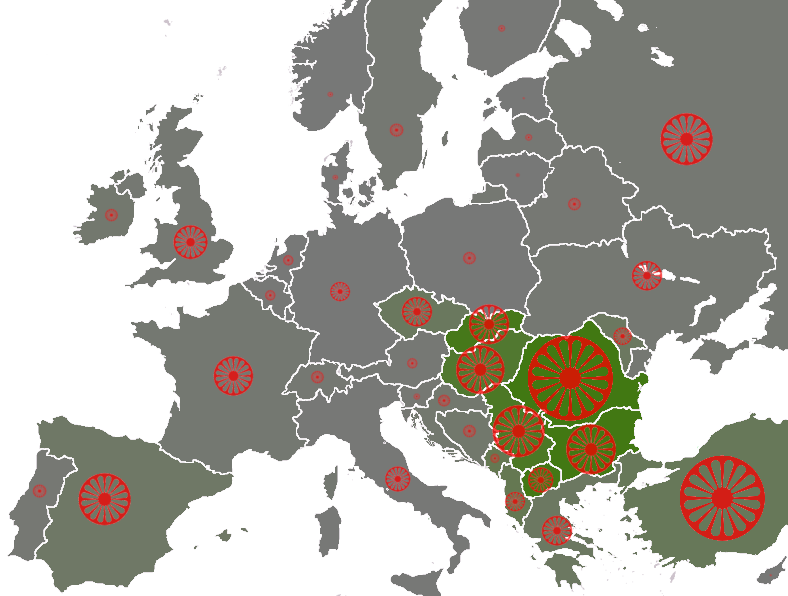Is there a people more despised in the world than the Romani? Probably not. When I lived in Europe I heard plenty of Anti-Semitic and Antiziganistic comments. Since this is a peaceful place, I won’t repeat any of them here (they ranged from ignorantly nonsensical to arguments in favor of ethnic cleansing). Nevertheless, I would occasionally meet someone who stand up to defend the Jews and denounce their enemies as jealous racists. A few minutes later though, the same people would also mock the Romani (who are perhaps better known by the arguably derogatory term “Gypsy.”)

Distribution of the Romani people in Europe, with the largest wheels representing a larger population
I for one have always felt that racism can be fairly hypocritical. The same people who will say vile things against Mexicans in the US probably really like going out for tacos and fajitas. Others who hate black people may thoroughly enjoy hip hop music. So, is this any way to thank them? The Romani have also contributed greatly to music, culture, and fashion in the Western world. Yet in too many countries radical right-wing, neo-nazi hate groups claim that they’re the source of all the nation’s problems. I find it hard to believe that a group that’s been left so destitute and helpless by the community and governments that many survive by digging through garbage could really be considered so a large threat, but these are the times we live in. These days, middle-class people enjoying a high quality of life are being made to feel like victims, while the real victims are made out to be enemies of the state.
So on this day we want to show solidarity with the Romani people, as well as the groups that work to improve their lives (see Amnesty International’s piece here and US Sec. of State Clinton’s comments here). We also want to celebrate Romani culture from a food perspective, which is easier said than done. Linguistic evidence has shown that the Romani people originated in India, and migrated west to Europe and various parts of the Americas (Texas, for instance, has a decent sized Romani population). Wherever they are, they tend to take on aspects of the surrounding culture, so what a Romani eats in Germany is different from one in say Bulgaria). Several Hungarian dishes claim to be cigány or gypsy in origin, including one of my favorites—cigánypecsénye. Unfortunately though, this dish requires a lot of pork, which I can’t get in the Middle East. So we opted for cigány csirkés lecsó, with the recipe here in Hungarian. Basically I just made up lecsó, which is similar to French ratatouille, and is made of fried onion, yellow bell peppers, and tomatoes. Since it's Hungarian, feel free to add a little bit of paprika as well. I basically cooked all this in the crock pot with the chicken for a few hours.
The recipe said to eat it with bread, but we wanted something a bit more filling so we went with pasta. Here's to hoping for a better, more equal world for everyone.



No comments:
Post a Comment